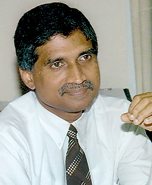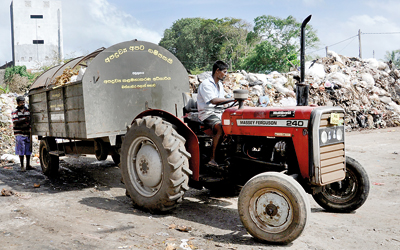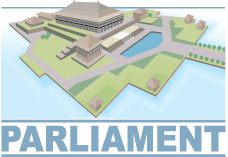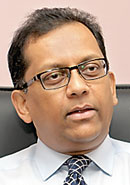News
What ails our local authorities?
As November 26, the birth anniversary of the late Lalith Athulathmudali, drew near, many people requested me to write about the present day political context. A lot is happening not only around us, but above and beyond as well. Provocative as it may be for me to comment on all these goings on, I feel I should not, as it might stand in the way of my intention to pay tribute to a great politician.

Kesarralal Gunasekera
Over the years I have spoken volumes about Mr. Athulathmudali and his great personality and character. The fact remains that the country is yet to see a leader of his calibre. Each year, we feel his absence more and more as our systems fail to serve the public.
This year I have chosen to talk about an area which is ailing due to systemic failures; the local authorities, I have decided to concentrate on this not only because it is close to my heart, but more so because its role and purpose are totally neglected in the Sri Lankan context.
The fundamental force in any developed country is the local authority system. It provides essential services to the public from pre-natal to death to make the day-to-day life easier for the people. Take for instance the 9/11 incident in New York, It was the local authority that came to the rescue and rebuilt the city.
The United States President honoured not the governor or the senator but the Mayor of New York and his team. The recent Olympics and Paralympics were managed by the Mayor’s office in London. This shows the great work that can be done by the local authority, a service-oriented setup which has simple but vital systems to serve its clientele; the taxpayer.
The yesteryear
The elected ward member was a respected figure whose intention was to serve the public. People always addressed the person as “Mamber Mahattaya/Nona”. These members literally walked with the people. Therefore, the people had the ability to interact with them and get the services they wanted. Be it the member or the worker of a council, they were devoted to their work. Their whole life was service-oriented.
Their dedication to service was such that the authority did not require layers of supervisors. All this earned the local authorities of yesteryear a certain place in and a high regard from society. Members won again and again through sheer service; it was the performance that made them popular and not the pomp and pageantry that we see these days during local authority elections. Unlike today, everything was done by council workers.
At present, most of the functions are outsourced and therefore those who bid for these contracts are willing to pay money to council administrators leaving much room for corruption.
Unfortunately the introduction of preferential voting system has changed everything for the worse. As a result it is money that decides the winners at elections. Gone are the days when people trusted people according to their strength of character and service to society. Today even the voter has been made ignorant to elect the one who spends more and has more colour in his or her campaign. However, it must be emphasised that the recent amendments to the local authority elections, fundamentally reverting to the old system will also at this juncture “will not achieve the desired results”.
Range of services
I would, however, like to focus more on the governance structure with special attention on how local authorities have been sidelined. Right on top we have the Executive, then Parliament which are followed by provincial councils and local councils. With the advent of the 13th Amendment to the Constitution, and the change in the electoral system, local authorities began to lose their glory. Up until then, the local authority was a mini government in its area functioning to the satisfaction of the rate payer. Even after the 13th Amendment, it remains a mini government, but without its sparkle.

Today the local council has been reduced the status of the Government’s garbage collecting arm. Inset: Kesarralal Gunasekera
Under the patronage of local authorities, life began at zero years with pre-natal clinics for pregnant mothers. This was followed by ante-natal clinics which provided healthcare guidance for lactating mothers. Disease prevention was one of their key responsibilities. In the event of a fire it was often the local authority that came to the rescue.
Local authorities also ran pre schools and early childhood development centres to ensure that children receive the right foundation in life. Today, this function is hardly being played by local authorities. In addition, they set up parks, play grounds and recreation centres.
Any construction in the area required the approval of the local authority.
Road maintenance was another area which the local authorities were known for. Infrastructure, drains, sewerage, culverts, street lighting, drainage control, rain water and construction and maintenance of roads and by roads were the responsibilities of the local authority.
They were also involved in work relating to burials and cremations of the dead. Cemetery and rematorium construction and maintenance came under their purview. This proves that the local authority had been a strength in the lives of people from before birth to beyond death. Unfortunately after 70 years of existence, the local authority has been reduced to literally ‘garbage collecting unit’ of the Government in the eyes of the public, not to mention that has changed from a place of glory to ‘gori’ where councilors fight.
What really ails the local authorities? One of the main reasons is the lack of attention from the Centre both in terms of enacting laws as well as allocating necessary funds, while the other being the provincial councils trying at every turn to usurp the functions of local authorities and take away part of their revenue. For example when we were in Parliament, in 1996 an experts’ report on Local Government Reforms was tabled. The purpose of this report was to change laws which were archaic. Up to date the Government has not shown interest in this, and the report is gathering dust. So the local authorities and the public are suffering due to archaic laws.
Besides the Provincial Council system, the lack of knowledge on the part of elected PC members also contributes to the issue. Funds allocated for local authorities are acquired by PCs while some of the roles and responsibilities of local authorities have also been taken over by the PCs and the Government.
Although the 13th amendment to the Constitution states that the powers, roles and activities of the local authorities cannot be taken away but strengthened, the PCs through various legislations have systematically taken away the autonomy of the local authorities. To cite a classic example, certain PCs have through statutes have brought in legislation to ensure that 100% of the revenue is not given to local authorities. Even the Ministry of Local Government and Provincial Councils no longer has the teeth to function at its best. It is not one of the well resourced ministries which can make a case on behalf of local authorities.
Funding
Funding is the biggest challenge that the local authorities face. For instance a tractor or a backhoe or a sewerage bowser costs millions of rupees. A local municipality cannot afford to purchase one although the need is great. Many of the councils have bowsers but are more than 25 years old. In time to come these councils run the risk of not being able to fulfil their primary duties. The Government is not that eager or generous to allocate funds.
Another challenge is that the monies for local authorities are being channelled through PCs. This includes salaries of council members and staff. At present, only 85 per cent of the salaries are being transferred by the PCs in relation to certain councils. The balance is withheld. According to statistics, of the 330 local authorities, 170 make less than 10 million in revenue. They certainly need to invest in equipment and technology to provide quality services. Such under resourcing not only leads to these agencies becoming inactive, but also paves the way for corruption.
Elected parliamentarians of the calibre of Mr. Athulathmudali spent much of their time solving problems to iron out systemic issues. He was able to bring all stakeholders together to discuss the best way forward. He had the humility to consult and seek advice from everyone concerned, a trait that we hardly see these days. He paid his fullest attention to problem solving and where necessary brought in laws to bring lasting solutions. Sadly we see public representatives having no time for people or the knowledge, experience or will to solve problems.
Primarily what we need to resurrect the ailing local authorities is the political will and a plan. To get there we need to acknowledge the issues through a consultative process. One suggestion is to bring the divisional secretariats and the local authorities under one roof to avoid public inconvenience. Suppose a person dies, in the present system, the family has to obtain the death certificate from the Divisional Secretary.
But then have to take it to the local authority to book the cemetery or the crematorium. In the event there is an error in the documentation, the family needs to go between these two offices which are not housed in the same premises. Merging offices will enable us to see such duplication of services and work out ways to provide smoother services. Another is to divide all local authorities into six groups and annually provide them with funds for capital expenditure on a rotation basis so that all local authorities will have funds eventually. My estimation for this is about two to three billion rupees every year.
After many years, we saw that in this year’s budget the President has allocated funds for local authorities based on a few proposals. We thank him for giving due consideration to the plea made by us. However, it needs to be recognised that development must be done at all three levels; local authorities, provincial councils and the Centre and all three levels needs to be strengthened equally. Holistic development is incomplete without the presence and the role of the local authorities.
Sen to deliver Athulathmudali oration on Jan 29
The Lalith Athulathmudali oration will be delivered by Nirupam Sen, India’s former High Commissioner in Sri Lanka and Permanent Representative to the United Nations, on January 29 at the BMICH.
He will speak on the subject of ‘Emerging Doctrine of Responsibility to Protect and the Nature of the United Nations’.
(The writer is deputy mayor of the Dehiwala-Mount Lavinia Municipal Council and former MP.)
Follow @timesonlinelk
comments powered by Disqus


























